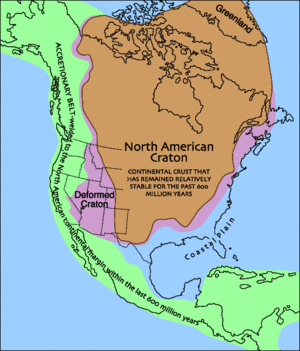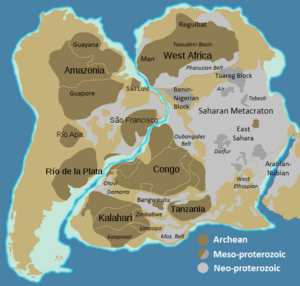Craton facts for kids


A craton (say: KRAY-ton) is a very old and super stable part of a continent. Think of it as the ancient, strong backbone of a continental plate. These parts of Earth's crust have been around for billions of years!
Cratons are found deep inside continents. They have survived many cycles where continents have crashed together and then split apart. They are made of very old, hard rock called basement rock. Sometimes, this ancient rock is covered by younger, softer sedimentary rock.
Contents
What Makes Cratons Special?
Cratons are unique because they are incredibly old and stable. They have a very thick crust and deep "roots" that go hundreds of kilometers into the Earth's mantle. The mantle is the hot, thick layer of rock beneath the Earth's crust.
How Old Are Cratons?
The rock in cratons can be up to 4 billion years old! That's much, much older than the rock found under the oceans, which is usually less than 200 million years old. This huge age difference shows how stable cratons are.
Cratons vs. Other Land Areas
The word craton helps us tell the difference between the super stable parts of continents and other areas that are more active. These active areas might have lots of earthquakes or volcanoes.
Types of Cratons
Cratons can appear in two main ways:
- Shields: These are areas where the very old, hard basement rock of the craton is visible on the surface. It's like the craton's ancient core is exposed for everyone to see.
- Platforms: In these areas, the old basement rock is hidden beneath layers of younger sedimentary rock. You can't see the ancient rock directly, but it's still there underneath.
Geologic Provinces
Scientists often divide cratons into smaller areas called geologic provinces. Each province is a region that shares similar types of rocks and geological features. It's like dividing a big country into smaller states or regions based on what they're known for.
See also
 In Spanish: Cratón para niños
In Spanish: Cratón para niños
 | Calvin Brent |
 | Walter T. Bailey |
 | Martha Cassell Thompson |
 | Alberta Jeannette Cassell |

